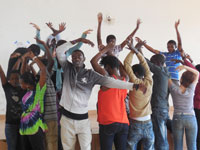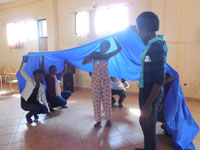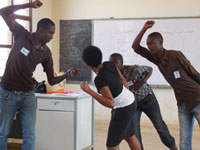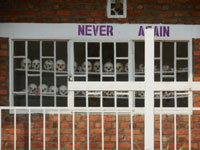Newsroom Archive




Professor Amy Green, Deputy Chair of the Interdisciplinary Studies Program, brought the transformational power of theater to war-torn Rwanda on a three-week research trip this past summer. Working in consortia with graduate students and faculty from the Master of Arts in Applied Theater (MAAT) at the CUNY School of Professional Studies, Green and her colleagues are bringing theater workshops to Rwanda in an effort to expand and sustain venues for expression, dialogue and communication in a country that lost up to a million men, women and children during the unprecedented 100-day genocide in 1994. This is the first year Green joined Project Rwanda which has been operating since 2010 under the leadership of Chris Vine and Helen White of the MAAT. For the past four years, the MAAT team has visited the Kigali Institute of Education (KIE), Rwanda’s public teacher training institution to share applied theater techniques and pedagogy. Applied theater is an umbrella term for interactive performance-based activities that are practiced outside traditional theater spaces with nontraditional participants and audiences for education, social change, and development.
In the aftermath of the genocide the Rwandan government created an initiative to expand channels of communication both within Rwanda and with the rest of the world. The country had been insular and isolated prior to the genocide.
“One thing that instigated the genocide is that there was no television, and only two radio stations, one was state run with official government speeches of the Hutu government. The other was a commercial radio station that promoted Hutu power and broadcast exhortations to civilians to join the army in hunting down and murdering Tutsis and moderate Hutus. Tragically, there were no competing voices in the mass media.”
In response to those conditions, Rwanda has invested in radio stations, laid fiber optic cables, added TV stations, and most significantly, the Rwandan Education Board added a drama requirement to the national curriculum to increase citizen’s communication skills and provide a forum for dialogue about the future of the country. In 2010, KIE initiated a drama specialization for its teachers-in-training, but the country had no qualified teachers in drama or theater practice. Through a series of fortuitous connections, KIE and MAAT found one another, launching the beginning of their remarkable partnership. This year, the students who were freshman in 2010 are graduating and will become the nation’s first cohort of drama teachers. Green’s agenda this summer was to research, to observe and document the project, interview KIE students, faculty, and administrators, to begin a critical assessment of the collaboration so far.
Each year, during their two-week residency, MAAT faculty and graduate students teach created and perform two plays. Even though Rwanda doesn’t have a tradition of drama, they do have an extensive tradition of music and dance, which Green described as, “very graceful, with complex harmonies and fluid movements” that refer to the culture’s rich agricultural tradition. “In fact, one of the great pleasures of the trip was the way the KIE students sang and danced together often and as naturally as walking. Part of the learning experience for both the CUNY and KIE students included an afternoon of cultural exchange in which they taught one another songs and dances from their own countries. Rwandan songs and dances were incorporated into this year’s plays as well.
Green explained that many of the KIE students were alive during the genocide and had lost their families and have witnessed horrible violence. They are eager to help rebuild their country and create a brighter future for their own generation.
“The hunger of these students and the way they drank it all in, and how they gave themselves so freely was amazing. “While on the surface, it looks like everything is great, but there is still a lot of pain Rwanda has few marketable natural resources, so they are investing in their people. They are making education the priority, which is brilliant, but underneath all that entrepreneurial spirit there is this wounded people.
“I was really impressed at how easily and deeply the Rwandan students translated issues in their own world into these forms. It was amazing to see, how with relatively little training, two weeks here two weeks there, they are able to embrace the techniques and make them their own. Their enthusiasm and willingness to try new challenges and deal with difficult themes was a moving tribute to the strength of the human spirit. These young people are so positive. They are totally committed to the idea that they can and will make a new and better society,” said Green. “It will be fascinating to see what role interactive applied theater can play in realizing and maintaining that dream.”
 Inside JJC (Faculty & Staff)
Inside JJC (Faculty & Staff) Technology Services Status
Technology Services Status

